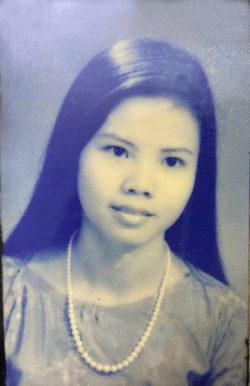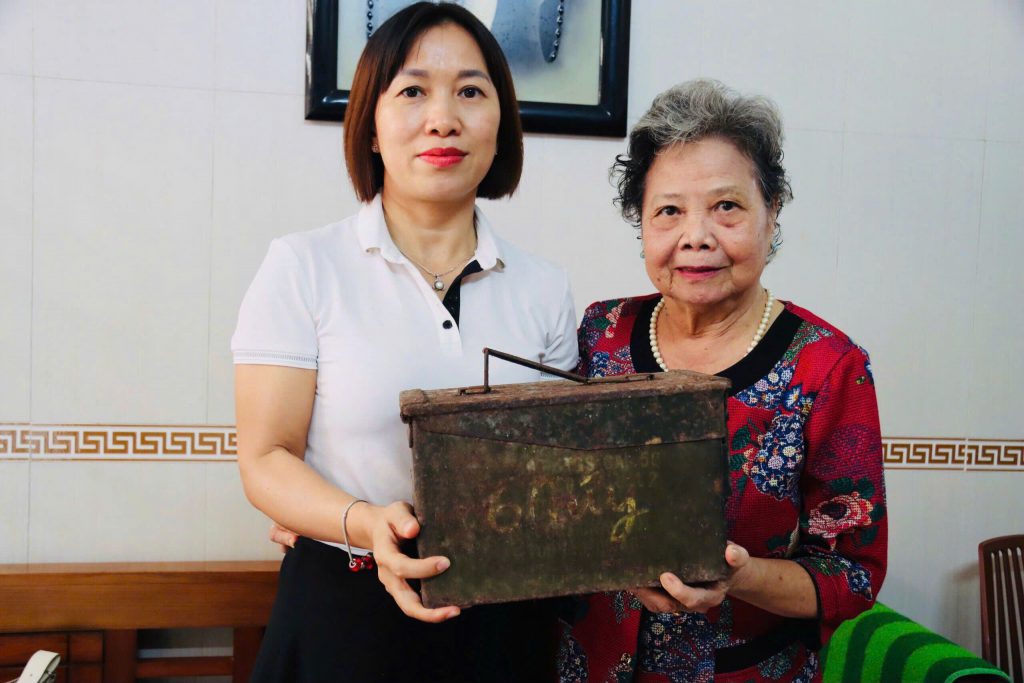Seeking Beloved Husband in the Great Victorious Spring
On April 30, 1975, amid the sea of jubilant crowds pouring into the streets to welcome the liberation army and to celebrate the resounding victory of the historic Ho Chi Minh Campaign, there was a woman who quietly stood apart, her eyes filled with anxious longing. She was Mrs. Huynh Quan Thu, a cadre of the Saigon-Gia Dinh Youth Union, a young wife desperately yearning for the return of her beloved husband. At that moment, she did not yet know that, just two weeks before the complete liberation of Saigon, her husband had bravely fallen in battle on the road into the city.
From the lecture hall to the fiery battlefront
Mrs. Huynh Quan Thu (alias Tu Vinh) was born in 1943 in Saigon. The nurturing of her family, her teachers, and especially her father instilled in her a deep love for the homeland from an early age. She recalled: “Whenever our friends were in difficulty, my sisters and I would help them, and our parents always supported us. Once, my father told me: ‘By helping like this, you can only support a few individuals; but by joining the revolution, you can help the whole community.” Those words left a profound mark on her heart and began to shape the path she chose: to fight the Americans and save the nation.
After finishing high school in My Tho, she enrolled at the Faculty of Letters, University of Saigon. Following the mission assigned by her organization, she ran for the position of Standing Committee Member of the Student Representative Council of the Faculty of Letters for the 1966-1967 term and was elected. In the 1967-1968 academic year, with thorough preparation from the organization and strong support from her teachers and peers, she was elected Vice President for External Affairs of the Faculty of Letters Student Executive Committee, and later became Secretary-General of the Saigon Students’ Union. Active and energetic in both the Faculty of Letters and the Saigon Students’ Union, she was arrested in December 1968. Released in August 1969, she immediately resumed revolutionary activities. By March 1970, when 41 students from Saigon universities were arrested, she was discovered and closely monitored by secret agents. Forced into hiding, she left her family and moved into the resistance base, entering a new and challenging chapter of her life.
Life in the revolutionary war zones was harsh and deprived in every way-constant bombings, gunfire, and sweeping enemy raids. Life and death were often only a breath apart. Yet, it was precisely this harsh environment that forged in her a spirit of resilience and determination. Hardship did not weaken her will; on the contrary, the greater the trial, the stronger her revolutionary resolve became, steadfast on the path she had chosen.
From the Faculty of Liturature to a Wedding in the Revolutionary Base

Chân dung bà Huỳnh Quan Thư hồi trẻ
It was at the Faculty of Literature, during the vibrant days of the 1967-1968 student movement, that Mrs. Huynh Quan Thu first met Mr. Le Quang Loc. They shared the same ideals and stood side by side in the struggle. From comradeship blossomed a pure and quiet love. That love was kept secret, known only to the organization, for discipline and safety were above all else.
In early 1968, Mr. Le Quang Loc was ordered into the resistance base to join the Alliance of National, Democratic, and Peace Forces of Vietnam. His departure was urgent and clandestine, leaving no chance for the two to bid farewell. Mrs. Huynh Quan Thu remained in the city, continuing her activism in the Saigon student and youth movements. Because of the ferocity of the war, the couple lost contact for a long time, until it was reestablished through a mutual friend. To maintain secrecy, they exchanged letters through a post office box in France. Although there was never a formal promise, in their hearts they already belonged to each other, bound by unwavering faith in reunion and in the day of national reunification.
After nearly three years of separation, in December 1970, the organization arranged for Mr. Lê Quang Lộc to return to work at the Saigon-Gia Dinh Youth Union, where the two were reunited. Their love, tested by distance and war, culminated in a simple yet warm wedding in early April 1971, held at the Youth Union’s base along the So Thuong River (Hong Ngu, Dong Thap), near the Vietnam-Cambodia border.
Being wife and mother in the wartime
In July 1971, the Youth Union base relocated to BongKong, Cambodia. The base was set deep inside a vast, dense, and humid forest, teeming with monkeys. At that time, Mrs. Huynh Quan Thu was expecting her first child. As Chief of Office, Mr. Le Quang Loc’s work kept him constantly occupied, often returning late at night. Nearing childbirth, she had to steel herself to bid farewell to her husband and return to Saigon to live legally, ensuring safety for both mother and child. Three months after giving birth to their first son, she reestablished contact with the organization. With a heavy heart, she entrusted her infant to her family’s care and once again left for the base. Boarding the boat to depart Saigon, she wore dark glasses to hide her tearful, reddened eyes as she wept for her child.
Later, together with a group of Saigon students, she traveled to the Youth Union base in Cambodia to attend the congress at the end of January 1973. The journey, taken through secret routes over fifty days and nights, was filled with hardships and close brushes with death when confronted by the enemy. There, husband and wife were reunited-overcome with joy and tears. Yet in those rare and fleeting moments together, whenever their thoughts turned to their little child left behind in the occupied zone, sorrow pierced their hearts.
After the Paris Peace Accords, the Youth Union reopened its routes back into the South. On the way, there was an incident where the couple narrowly escaped death in a helicopter attack. That near-death experience moved her to a solemn decision: to bear another child, so that if both parents were to fall in battle, their children would have each other to lean on. She conceived their second child at the Thanh An base (Ben Cat, Binh Duong). And once again, as the day of delivery drew near, she had to return alone to Saigon to stay with her parents. Both times, she gave birth without her husband by her side, forced to assume the guise of “the mistress of a captain” to avoid suspicion from the enemy and neighbors. Each time, her heart felt as though it were being torn apart. Yet for the safety of herself, her husband, and the revolutionary organization, she endured it all.
The Heartbreaking Loss before the Great Victory of Spring
In early 1975, the war in the South was escalating. After months of separation and longing, twice did Mr. Le Quang Loc write letters urging his wife to bring their son into the base so he could see him. Understanding her husband’s yearning to embrace his child, and despite knowing the journey was perilous, Mrs. Huynh Quan Thu was determined to take their eldest son, then nearly four years old, through bombs and gunfire into the war zone. For ten brief days, they lived together in the warmth of family affection. Yet with deep reluctance, she once again bade farewell, taking the boy back to Saigon so both husband and wife could prepare for the decisive battle ahead – the historic Ho Chi Minh Campaign. She could never have imagined that this would be their last meeting. On the march to liberate Saigon, the vanguard unit under Mr. Le Quang Loc’s command fell into the enemy’s artillery fire. He fought bravely to his last breath and was killed in Dong Thanh commune, Hoc Mon district, on the night of April 14 to the dawn of April 15, 1975 – yet Mrs. Huynh Quan Thu remained unaware.
On April 30, 1975, Saigon’s skies were ablaze with red flags bearing the yellow star. Amid the jubilant crowds celebrating victory, Mrs. Huynh Quan Thu, still wearing the armband of the Saigon-Gia Dinh Self-Defense Youth Force, was restless, running everywhere in search of her husband. At the Military Hospital of the Republic (now Military Hospital 175), her heart tightened as she anxiously opened door after door, scrutinizing the faces of the wounded with the fragile hope that he might only be injured. But she did not find him. She hurried to the morgue, trembling as she pulled open the cold drawers one by one – still no trace. Desperately, she rushed to Hoc Mon, and there she found his grave, marked with the scarf she had sewn with all her love-still stained with his blood from the moment of sacrifice.
“My life has known much misfortune, but I have always endured with courage-largely because of the immense, steadfast love and support of my family, the organization, my comrades, friends, and the many kind people around me,” said Mrs. Huynh Quan Thu.

Bà Huỳnh Quan Thư (vợ liệt sĩ Lê Quang Lộc) trao tặng kỷ vật cho Bảo tàng Mặt trận Tổ quốc Việt Nam.
Martyr Le Quang Loc, comrade and lifelong partner, passed away forever on the very threshold of the Spring of Great Victory, leaving Mrs. Huynh Quan Thu with immeasurable grief. The loss was so devastating it could have crushed the petite woman. Yet the courage and willpower forged in the flames of war helped her stand tall. She threw herself into work as a way to overcome her sorrow and to devote her strength to the rebuilding of the nation.
Taking on the heavy responsibilities of Standing Committee Member of the District Youth Union, Head of the Children’s Division of the Binh Hoa – Binh Thanh Youth Union, later serving as an officer of the Department of Commerce and then as Deputy Director of the General Department Store of Ho Chi Minh City (the famous TAX Trade Center), she worked tirelessly day and night. At the same time, she pursued further studies and diligently raised her two children. In all the years after her husband’s sacrifice, though many opportunities arose to “move on,” she remained unwaveringly faithful and devoted to the memory of her late husband. She upheld revolutionary ethics, living a simple, generous, and compassionate life with her comrades, colleagues, and neighbors.
She raised her children with love, guided by her own example of patriotism, sacrifice, and the moral principle of “when drinking water, remember its source.” She told them stories of their heroic father, of family traditions, and of the comrades who had given their youth for the homeland. Under her guidance and inspired by the legacy of their parents, both children strove to excel in life and career, continuing along the path of national construction and defense that their mother and father had walked.
Bui Thi Hoan
Source: Vietnam Women’s Newspaper
